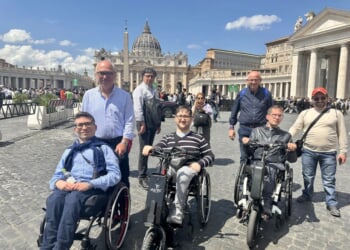I remember an event from that last summer we spent in Santa Margherita Ligure. After dinner, while Carlo was finishing his summer vacation homework, we received a phone call. It was one of his female friends. Carlo, wanting to be discreet and not disturb me [Antonia] as I worked, stepped aside. But despite this, I could hear his words clearly. So, without wanting to, I overheard him. I had never eavesdropped on other people’s conversations. And I’m not a nosy mother. But that evening, overhearing what he said was unavoidable.
I was immediately struck by the way in which Carlo addressed his friend: he reprimanded her in a very paternal way but also with firmness and self-assurance. And then I was also struck by the content: as far as I could understand, the previous evening his friend had met a boy at a disco and had had intimate relations with him.
Carlo was earnest about purity. He was not in the least a bigot. Rather, in the light of faith, he recognized that everyone has a special dignity to be respected, not consumed or devoured. He reminded his friend that “our body is a temple of the Holy Spirit” (1 Cor. 6:19) and that, through our Baptism and our life of faith, God “makes his home with us” (cf. John 14:23). For this reason, he told her not to jump ahead into what is reserved for marriage.
On other occasions as well, he spoke with his friends about this subject when they confided in him that they were getting ahead of themselves and wanting to engage in premarital intimacy. Carlo bore witness to purity, but not as an end in itself. Nor as mere asceticism or out of fear of something. His motivation was that love, even between a boy and a girl, must be lived as a gift of God and therefore in His presence and according to His design of holiness. And only in this way can human love give an abundant harvest of happiness. If, on the other hand, we take a crush or a passing fancy for love and follow its lead, we will never reap the fruits of full and lasting joy.
At times he seemed to be a priest talking. It almost made me smile when he told his female friend or other friends about the dignity of our body as the temple of the Holy Spirit, of the Most Holy Trinity. He said, “The Father has a throne in Heaven, and the Son too, who sits at His right hand, but the Holy Spirit has our hearts as His throne since they become temples of God. This is why we have to respect the sacred reality of our soul and our body, and not trivialize love, reducing it to a mere ‘exchange of pleasure’ aimed only at satisfying selfish desires and not at the true good.”
When Carlo spoke about the passions and falling in love, he talked of how love is able to desire and do the greater good of the beloved, how it can renounce the longing to possess the other person, to subjugate the person to ourselves. He lived love in a detached way; it was not a lack of interest, but rather knowing that the other person is a child of God and therefore belongs to God. In personal relationships God is always present, for He is the Father of all.
I also remember hearing him scold several of his friends who boasted of looking at pornographic websites, of reading things he defined as “dangerous for the soul,” or of practicing “auto-eroticism.” He told these friends that in this way they became like the puppets in Pinocchio, the ones Mangiafuoco used in his shows and, after using them, threw them in the fire. With this image of the wooden puppets, he described the fate of people who, unable to resist temptations and letting themselves be overcome by vice, live like puppets: they no longer have self-control. Ultimately, they experience the total defeat symbolized by fire.
To Carlo, staying far away from pornographic sites or from inappropriate materials was not about bigotry. It was the only way not to be contaminated, not to open the door to behaviors that leave a bitter taste in our mouths and do not make us happy. This is why he repeated to his friends: “Happiness is in loving others as God loves them and not in venting our selfish desires on others.”
Editor’s Note: This article is excerpted from an interview conducted with Carlo Acutis’ parents, Antonia and Andrea. The rest of the interview can be read in God’s Influencer, available from Sophia Institute Press.
Photo from CarloAcutis.com












